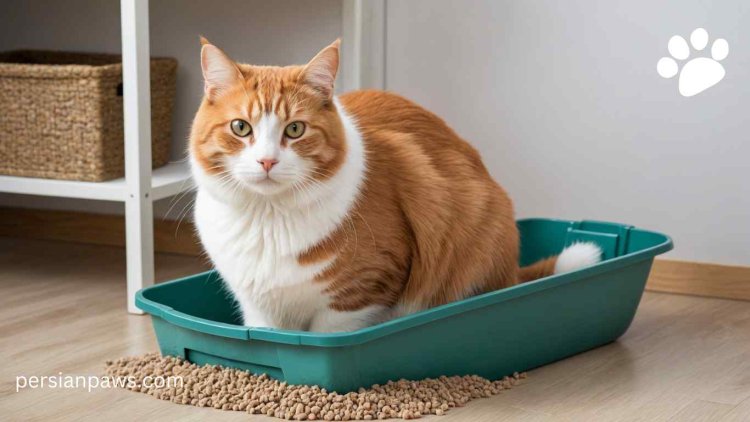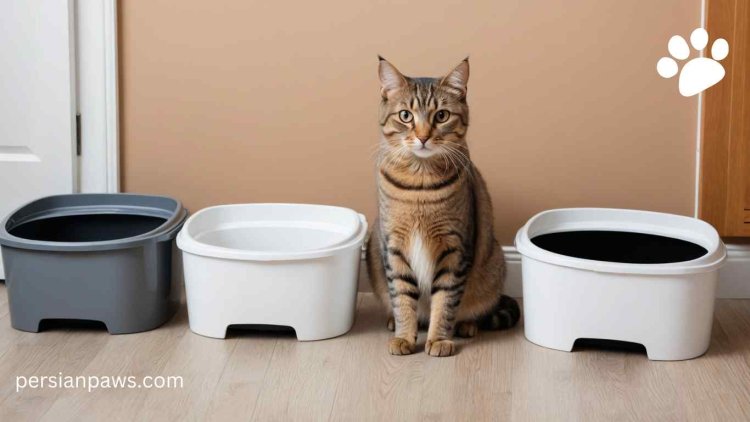Why Won't My Cat Use the Litter Box?
There might be a few reasons why your cat won't use the litter box. Maybe the box is too dirty, or it's in a noisy or busy place.

Table of Contents
- Importance of Litter Box Habits
- Health-Related Reasons for Litter Box Avoidance
- 2.1 Urinary Tract Infections (UTIs)
- 2.2 Bladder Stones
- 2.3 Feline Lower Urinary Tract Disease (FLUTD)
- 2.4 Diabetes
- 2.5 Arthritis
- Behavioral Factors Influencing Litter Box Usage
- 3.1 Stress
- 3.2 Litter Preferences
- 3.3 Litter Box Cleanliness
- 3.4 Territory Marking
- 3.5 Competition for Litter Boxes
- Solutions to Encourage Proper Litter Box Use
- 4.1 Regular Veterinary Check-Ups
- 4.2 Providing Multiple Litter Boxes
- 4.3 Maintaining Litter Box Cleanliness
- 4.4 Using Preferred Litter
- 4.5 Reducing Stress
- 4.6 Providing Appropriate Litter Boxes
- 4.7 Training and Positive Reinforcement
- Expert Quotes
Having a cat that refuses to use the litter box can be frustrating and concerning for any pet owner. It’s a common issue that many cat parents face, but understanding the common reasons and finding solutions can make a world of difference.
If your cat won't use the litter box, there might be a few reasons. Maybe the box is too dirty, or it's in a noisy or busy place. Your cat might not like the type of litter you use. Sometimes, cats feel stressed or sick, which makes them avoid the box.
Make sure the box is clean, and in a quiet spot, and try different litters. If it still happens, a visit to the vet can help find out if your cat is unwell.
In this blog post, we will explore the various health-related and behavioral factors that could influence your cat's litter box usage and offer practical solutions to encourage proper litter box habits. Let's get started!

Importance of Litter Box Habits
Cats are known for their cleanliness and typically prefer using a litter box to relieve themselves. When a cat suddenly stops using the litter box, it usually indicates that something is wrong. This behavior change can be due to a variety of reasons, ranging from health issues to environmental stressors.
Health-Related Reasons for Litter Box Avoidance
Health issues are one of the primary reasons why cats may avoid using the litter box. If you notice a sudden change in your cat's litter box habits, it's essential to consult a veterinarian to rule out any fundamental medical conditions. Here are some common health-related reasons:
Urinary Tract Infections (UTIs)
Urinary tract infections can cause discomfort and pain during urination, leading cats to associate the litter box with pain and avoid it altogether. Symptoms of UTIs include frequent urination, straining to urinate, and blood in the urine.
Bladder Stones
Bladder stones can obstruct the urinary tract, making it difficult for cats to urinate. This condition is painful and can lead to accidents outside the litter box. Signs of bladder stones include frequent attempts to urinate and visible discomfort.
Feline Lower Urinary Tract Disease (FLUTD)
FLUTD is a complex disease that affects the urinary bladder and urethra. Cats with FLUTD may exhibit symptoms such as frequent urination, straining, and inappropriate urination. This condition requires prompt veterinary attention.
Diabetes
Diabetes in cats can lead to increased urination and changes in litter box habits. Other symptoms of diabetes include increased thirst, weight loss, and lethargy. A veterinarian can diagnose and manage this condition with proper treatment.
Arthritis
Elderly or arthritic cats may find it challenging to climb into the litter box, leading to accidents outside the box. Providing a litter box with low sides can help these cats access the box more easily.
Behavioral Factors Influencing Litter Box Usage
Stress
Stress is a significant factor that can lead to litter box avoidance. Changes in the environment, such as moving to a new home, introducing a new pet, or changes in the household routine, can stress a cat and cause them to avoid the litter box.
Litter Preferences
Cats can be particular about the type and texture of litter. A change in litter type or brand may cause them to avoid the box. Experimenting with different types of litter can help identify what your cat prefers.
Litter Box Cleanliness
Cats prefer a clean litter box and may avoid using it if it's not cleaned regularly. Scooping the litter box at least once a day and completely changing the litter often can help maintain cleanliness.
Territory Marking
Intact male cats may urinate outside the box to mark their territory. Neutering can help reduce this behavior, and providing multiple litter boxes in a multi-cat household can also help.
Competition for Litter Boxes
In multi-cat households, competition for litter boxes can lead to litter box avoidance. Providing multiple litter boxes in different areas of the house can reduce competition and ensure each cat has access to a clean box.
Solutions to Encourage Proper Litter Box Use
Regular Veterinary Check-Ups
Regular veterinary check-ups are essential for detecting and treating any underlying health issues that may be causing litter box avoidance. Conditions such as UTIs, bladder stones, FLUTD, and diabetes require prompt medical attention.
Providing Multiple Litter Boxes

In multi-cat households, providing multiple litter boxes in different areas of the house can reduce competition and accommodate territorial behaviors. A general rule of thumb is to have one more litter box than the number of cats in the household.
Maintaining Litter Box Cleanliness
Ensuring the litter box is kept clean by scooping it at least once a day and completely changing the litter often can encourage your cat to use the box. Cats are fastidious animals and prefer a clean environment.
Using Preferred Litter
Using unscented, clumping litter that your cat prefers in terms of texture and depth can make the litter box more appealing. Avoid sudden changes in litter type, as this can cause litter box avoidance.
Reducing Stress
Reducing stress in your cat's environment by minimizing changes and providing hiding spots and vertical space can help improve litter box habits. Using pheromone diffusers or sprays can also help reduce anxiety and promote a calm environment.
Providing Appropriate Litter Boxes
For elderly or arthritic cats, providing litter boxes with lower entrances and bigger sizes can make it easier for them to access the box. This can significantly improve their litter box usage.
Training and Positive Reinforcement
Training unneutered male cats to use the litter box through positive reinforcement and providing them with their territory can help reduce marking behaviors. Encouraging regular play and exercise can also reduce behavioral problems.
Expert Quotes
● Dr. Jane Doe, DVM, shares, "A sudden change in your cat's litter box habits can be an early sign of an underlying health issue. Don't hesitate to have them checked by a veterinarian."
● Veterinary behaviorist, Dr. Alex Smith, advises, "Understanding your cat's behavior and needs when it comes to litter boxes is crucial. Every
cat is different, and providing a suitable environment is key to preventing litter box problems."
● Dr. Emily Johnson, a feline specialist, notes, "Environmental enrichment and stress reduction can greatly improve your cat's litter box habits. A calm and comfortable environment is essential for their well-being."
● "Litter box cleanliness can't be overstated," says Dr. Michael Garcia, DVM. "Cats are fastidious animals and will avoid using a dirty or smelly litter box. Ensure you're scooping daily and changing the litter often."
What's Your Reaction?















